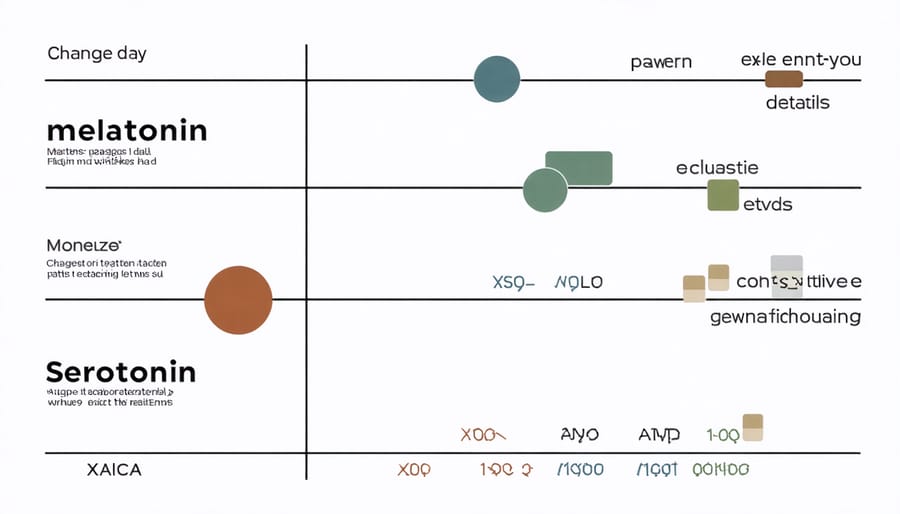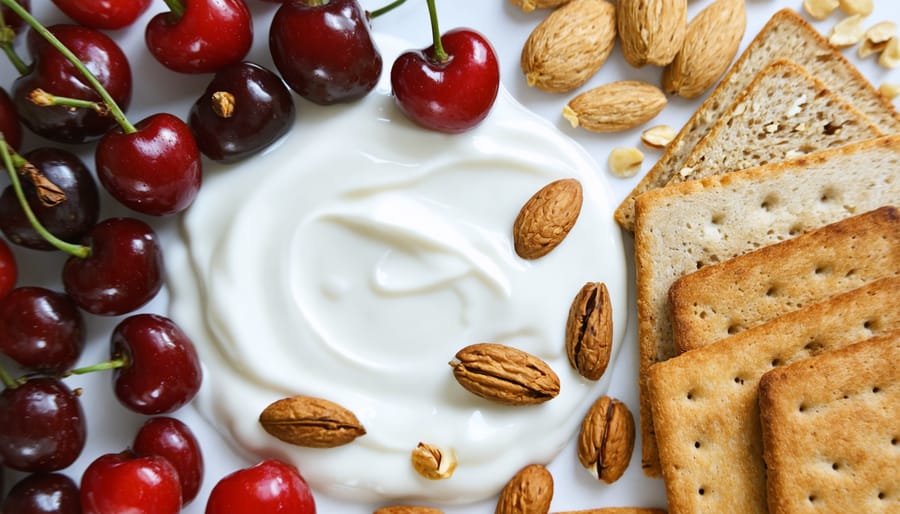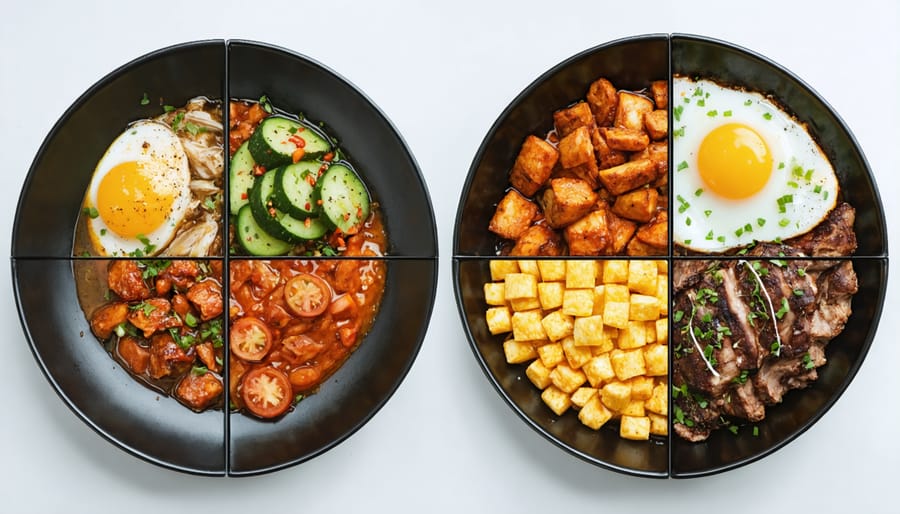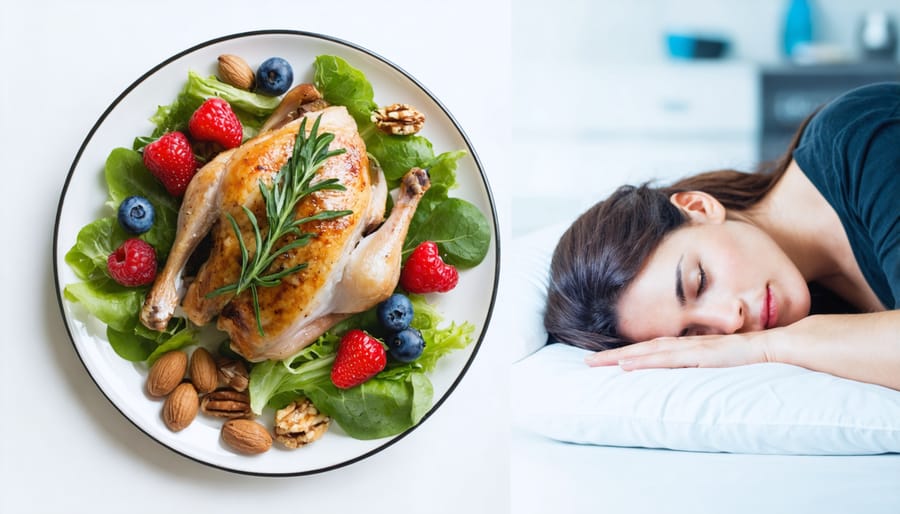Transform your sleep quality tonight by understanding the powerful connection between what you eat and how well you rest. The foods on your plate directly influence your body’s sleep-wake cycle, hormone production, and natural sleep patterns. Research shows that making strategic nutrition choices can help you fall asleep faster, stay asleep longer, and wake up feeling more refreshed.
Simple changes to your daily diet can make a significant difference in your sleep quality. Loading up on magnesium-rich foods like leafy greens, nuts, and whole grains helps regulate sleep-promoting neurotransmitters. Tryptophan-containing foods such as turkey, eggs, and dairy products boost your body’s natural production of melatonin, while complex carbohydrates help make tryptophan more available to your brain.
Timing matters just as much as food choice. Eating a balanced dinner about 3 hours before bedtime gives your body time to digest properly while maintaining stable blood sugar levels throughout the night. Avoiding caffeine after 2 PM and limiting alcohol in the evening hours can prevent sleep disruptions and improve overall sleep architecture.
Understanding this sleep-nutrition connection empowers you to make informed choices that support better rest. By making thoughtful adjustments to both what and when you eat, you can naturally enhance your sleep quality and wake up ready to tackle each day with energy and focus.
The Science Behind Food and Sleep
Sleep-Promoting Nutrients
Several key nutrients play a vital role in supporting healthy sleep cycles and overall rest quality. Let’s explore the three most important ones you can easily incorporate into your daily diet.
Tryptophan is an essential amino acid that helps produce serotonin and melatonin, two hormones crucial for sleep regulation. You can find good sources of tryptophan right here in Alberta, including locally-raised turkey, chicken, eggs, and dairy products. Plant-based options include pumpkin seeds, oats, and chickpeas.
Magnesium is often called nature’s relaxation mineral because it helps calm your nervous system and prepare your body for sleep. Many Albertans may be low in magnesium, but you can boost your intake through leafy greens, nuts (especially almonds), and whole grains. During summer, try adding locally-grown spinach and Swiss chard to your meals.
B vitamins work together to regulate sleep patterns and manage stress levels. While B12 supports your body’s sleep-wake cycles, B6 helps produce melatonin naturally. You’ll find B vitamins in many everyday foods like whole grain breads, legumes, and lean meats. For vegetarians and vegans, nutritional yeast is an excellent B-vitamin source.
To make the most of these sleep-promoting nutrients, try combining them in your evening meals. For example, a dinner of whole grain pasta with turkey and leafy greens provides all three nutrients. Remember, consistency is key – include these nutrients regularly in your diet rather than relying on them only when sleep troubles arise.
Timing Your Meals for Better Sleep
The timing of your meals plays a crucial role in maintaining a healthy sleep routine. Just as our bodies follow a natural daily rhythm, our digestive system also operates on a schedule that can either support or disrupt our sleep patterns.
Try to eat your last major meal at least 2-3 hours before bedtime. This gives your body enough time to digest food properly and helps prevent discomfort that could keep you awake. If you’re hungry closer to bedtime, opt for a light snack that combines complex carbohydrates and protein, such as whole grain crackers with cheese or a small bowl of yogurt with berries.
Be mindful of your caffeine intake throughout the day. While that afternoon coffee might seem tempting, caffeine can stay in your system for up to 8 hours. Consider switching to caffeine-free beverages after 2 PM to avoid sleep disruption.
Staying hydrated is important, but try to reduce fluid intake in the evening to minimize nighttime bathroom trips. A good rule of thumb is to drink most of your daily water intake before dinner time.
For shift workers in Alberta’s 24-hour industries, try to maintain consistent meal times even when working irregular hours. This helps regulate your body’s internal clock and supports better sleep quality, regardless of when your “bedtime” occurs.


Foods That Help You Sleep
Best Evening Snacks
When hunger strikes in the evening, choosing the right snack can support your body’s natural sleep cycle. Opt for small portions that combine complex carbohydrates with a touch of protein, which can help maintain stable blood sugar levels throughout the night.
Great evening snack options include a small handful of almonds with a few dried cherries, which naturally contain sleep-promoting melatonin. A banana with a tablespoon of peanut butter provides potassium and tryptophan, nutrients that can help you feel drowsy. Greek yogurt topped with honey and sliced figs offers both protein and natural sugars that won’t spike your blood sugar.
Try to enjoy your evening snack about two hours before bedtime to allow for proper digestion. Keep portions modest – aim for around 150-200 calories. This gives your body enough fuel to maintain steady blood sugar levels without overwhelming your digestive system.
Avoid snacks high in refined sugars, caffeine, or excessive fats, as these can disrupt your sleep quality. Instead of reaching for chips or cookies, keep sleep-friendly snacks readily available in your kitchen for better nighttime choices.
Foods That Disrupt Sleep
While many Albertans focus on what to eat for better sleep, it’s equally important to know which foods can interfere with quality rest. Caffeine is perhaps the most well-known sleep disruptor, and it’s found in more than just coffee. Tea, chocolate, and some soft drinks contain varying amounts of caffeine that can affect your sleep, especially when consumed in the afternoon or evening.
Spicy or heavily seasoned foods can trigger indigestion and raise your body temperature, making it harder to fall asleep. Try to avoid these foods within three hours of bedtime. Large, high-fat meals are another culprit – they require more energy to digest and can cause discomfort when lying down.
Alcohol might make you feel drowsy initially, but it disrupts your sleep cycle later in the night, leading to poor sleep quality and early morning wakefulness. Even though a nightcap might seem helpful, it’s best to avoid alcohol close to bedtime.
Hidden sugars in processed foods and desserts can cause blood sugar fluctuations that interrupt sleep. Watch out for seemingly healthy options like flavoured yogurts or granola bars, which often contain added sugars.
Foods high in tyramine, like aged cheeses, cured meats, and fermented foods, can stimulate brain activity and keep you awake. If you enjoy these foods, try to consume them earlier in the day.
The good news is that being mindful of these foods doesn’t mean eliminating them completely – it’s all about timing. Simply adjusting when you consume these items can make a significant difference in your sleep quality.

Creating Your Sleep-Friendly Meal Plan
Building a sleep-friendly meal plan doesn’t have to be complicated. Start by planning your dinner around foods rich in tryptophan, like turkey, chicken, or fish, paired with complex carbohydrates such as brown rice or sweet potatoes. These combinations help your body produce sleep-promoting serotonin naturally.
For lunch, focus on magnesium-rich foods like leafy greens, nuts, and seeds. Consider adding a handful of almonds or pumpkin seeds to your midday meal. Keep your portions moderate, as heavy meals can interfere with healthy sleep habits.
Time your meals thoughtfully: eat dinner at least 2-3 hours before bedtime to allow proper digestion. If you need an evening snack, choose something light like banana and almond butter, or cherry yogurt. These snacks provide natural melatonin without overwhelming your digestive system.
Remember to stay hydrated throughout the day, but taper off fluid intake in the evening to minimize nighttime bathroom trips. Keep a food diary for a week to track how different meals affect your sleep quality.
The connection between sleep and nutrition is clear: what you eat directly impacts how well you rest. By making mindful choices about your diet, you can significantly improve your sleep quality. Focus on incorporating sleep-promoting foods like cherries, nuts, and whole grains into your evening routine while limiting caffeine, alcohol, and heavy meals close to bedtime. Remember that small changes can lead to big results – start by choosing one or two dietary adjustments and build from there. Your body and mind will thank you with more restful nights and energized days. Whether you’re dealing with occasional sleep troubles or looking to enhance your overall well-being, the power to improve your sleep quality is right there on your plate. Take that first step today toward better sleep through better nutrition – your journey to healthier rest begins with your next meal.

